 “Whoever does not receive the kingdom of God as one receives a homeless person will never enter it.” Here are some streams of thought that sprung from my sermon prep on Luke 18:15-30 (which is posted fully at the end). For now, this passage is two stories that are most definitely linked together: Infants and children being brought to Jesus for a blessing, being told that the kingdom of God belongs to them, and a rich young ruler who asks how he may obtain eternal life. Additionally, the previous Wasted Blog post is a part of this stream of sermon prep thought: A blunt text, rationalizing, and a confession: a brief reflection on Luke 18:22. There is little doubt that this is about the gospel and the poor: who are we?The wider section of Luke 14-18 that we have been journeying through during the Saturday Sidewalk Sermons and Sunday morning sermons reveals whom we are to seek and welcome to the Table of God‘s Kingdom--that is, whom are to be invited to salvation in Christ, that is eternal life. There is little doubt, the invitation is for the least among us . . . don’t get me wrong, of course, the wealthy and well-off and those who have the privilege and blessings of this age’s systems and structures are invited to come sit with them (it seems this is the Gospel process). In our current passage (Luke 18:15-30), the young rich ruler is instructed to give his wealth to the poor . . . two things to be noted here: 1) for those that didn’t catch this earlier on my facebook feed, this principle was understood by both Jesus and his disciples as a principle to be followed broadly by the rich if they were to be followers of Jesus; and 2) this was what Jesus was modeling--something this young rich ruler could not, in the end, imagine doing, for he walked, sadly, away from Jesus’ gracious invitation to enter the kingdom of God. Perhaps on this Day of giving thanks, we can find a way to give away what we have to the least among us. Most of us will give thanks around a Thanksgiving table for the bounty God has given to us--often accompanied by a comparison to those who have little or nothing (“Lord, we thank you for what we have, for we know that so many are not as fortunate,” et al.) . . . this is more in line with the Pharisee in the preceding parable, who compared himself to others. The parallel in the Luke 6 Beatitude: The kingdom of God belongs to the poorA thought from my sermon text, Luke 18:15-30: the reference to the kingdom of God belonging to the children means these two stories are a poor vs. the rich contrast and we should suspect that deconstruction, a reversal, is afoot: V. 16: But Jesus called them to him, saying, “Let the children come to me, and do not hinder them, for to such belongs the kingdom of God” (ἐστὶν ἡ βασιλεία τοῦ θεοῦ). Note the parallel: Luke has already told us back in chapter 6 that “Blessed are you who are poor, for yours is the kingdom of God” (ἐστὶν ἡ βασιλεία τοῦ θεοῦ. 6:20). And surprise, surprise, the very next thing is a scene of a rich young ruler wanting eternal life (i.e., entering the kingdom of God), who is then told to give to the poor, and walks away from (eternal life!) “because he was wealthy.” Recall how Luke presents the Kingdom Beatitudes back in chapter 6 . . . he parallels the poor/kingdom (6:20) with “But woe to you who are rich, for you have received your consolation” (6:24). I’ll leave it right here . . . Love God, Love Your NeighborLuke 18:16 (just a verse from my whole text, Luke 18:15-30): “But Jesus called them to him, saying, ‘Let the children come to me, and do not hinder them, for to such belongs the kingdom of God.’” When the rich young ruler had heard Jesus say that the kingdom of God belonged to incomplete adults, those not fully human, that is children, this begged a question pertinent to his station and social status (which was good because he was wealthy, which meant he had a name that counts and a status that allowed all the privileges and, of course, he was a grown male which made him fully human). That question was, “Good Teacher, then how do I inherit eternal life*?” He obviously knows how to inherit riches: be born in a legacy family and be a grown male—this is the Rome-way. It is not Jesus’ way . . . this is what concerns that rich young ruler. As it should. As it should also concern us. While Jesus is far more than a mere Teacher as the rich young ruler had addressed him, he picks up on the word “Good” to help the young rich ruler grasp he is asking a first-commandment question—God is the only good, so remember, Love the Lord Your God first—but in the next breath Jesus directs the wealthy ruler to the second--which is like the first (cf. Matthew 22:39)—command, namely to Love Your Neighbor. Thus, give-God-all-you-got is to be met with selling-all-you-got-and-giving-it-to-the-poor, these are the twin sides of inheriting—not earthy riches, that’s easy, just be born with a name and have the right address—of inheriting eternal life. Not sure we’ve actually come to grips with this side of the gospel . . . it’s there, right in our text for Sunday morning (Luke 18:15-30). *The kingdom of God, eternal life, and being saved are all interchanging terms and concepts in Luke. An ellipsis: whoever models Jesus gets to enter into the kingdom of GodI grant the last of this thread is far more application than exegesis (but it’s that, too), yet it is an application that is a faithful reading and dynamic equivalent [you’ll see I do some translating here] to Luke’s and Jesus’ narrative intent (and of the Greek) found in Luke 18:15-30, specifically, verses 16-17: “But Jesus called them to him, saying, ‘Let the children come to me, and do not hinder them, for to such belongs the kingdom of God. Whoever does not receive the kingdom of God like a little child will never enter it’” (ESV). There are a number of things that are before us in the text, for they would have been before both the original audience of disciples and Pharisees, and, as well, those to whom the Gospel was written, namely Theophilus’ church community: 1) As already mentioned, infants and children would have been considered not fully human, incomplete adults, one the lower tiers of human hierarchy, both in the Jewish and the Greco-Roman world; 2) Children/infants simply would not have been presented, especially in public, to any Rabbi (and I note that Jesus is referred to by the rich young ruler as Teacher, aka a rabbi); 3) There would be ritual impurity amid the presentation of the infants that would have been improper for Jewish Rabbis, but obviously Jesus is impervious; and 4) Finally, there is an ellipsis in verse 17 that needs to be understood. Allow for an explanation of the ellipsis before moving on to my application (which reveals the intent of Jesus and Luke here): a grammatical ellipsis, whether written or spoken, is when some words are missing yet assumed, offering some balance to the thought or sentence that is implied by the author and supplied by the hearer/reader. Examples: “John saw two hawks in the sky, and Bill saw three” and “Amanda is managing the restaurant Thursday, and Joseph is Friday.” The second example is like our Luke 18:17 ellipsis, in that the verb “manage” is left out but is clearly intended. The ellipsis in Luke 18:17 is the verb “receive.” The ellipsis is masked by the English word “like” (i.e., “like a child”). The word “like” implies to the English reader that it is the children we should be like. However, the ellipsis being crafted here is to imply that it is the “receiving” that we are to be like. Here’s my translation so you can here and see how the ellipsis works:
The “infants” and “children” are not coming or receiving Jesus in this story. They are not coming to Jesus because of something about them--we infer this, but it is not there in the text and the social/cultural location suggests otherwise. And, it is the parents who are bringing them to Jesus and Jesus is receiving them. Thus, the set up for the intended ellipsis. We should make a narrative link to what Jesus is doing. This is exactly what Jesus is modeling, “receiving children.” He is not receiving children as a child or like a child would--that’s our hallmark-card spin on it--but Jesus is doing the receiving, the welcoming of the children. This reading of the text, and hearing the cultural view of humans that is at play, allows us to apply this warning concerning the unavailability of the kingdom to those who do not welcome/receive children because Jesus has reversed the poles in His kingdom. Now, if we read--as we should--the other aspects before us in this text, namely infants/children would have disturbed the piety of a rabbi (i.e., the clean vs unclean) and the view that receiving them counters the tiered humanity prevalent at that time . . . it would be fair to render this verse: “Whoever does not receive the kingdom of God as one receives a homeless person will never enter it.” Of course, you can change “homeless” to be anyone whom you believe is less than human or unclean . . . and not only believe, but live in such a way that your modeling is nothing like Jesus’ model . . . and the danger? You will not enter the kingdom of heaven. This is affirmed by the next story of the rich young ruler choosing not to model Jesus and turns away from the kingdom. Luke 18:15-30 (ESV)
0 Comments
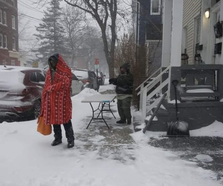 This is both blunt and transparent . . . Luke 18:22, a verse in this Sunday's Sermon text . . . “When Jesus heard this, he said to him, ‘One thing you still lack. Sell all that you have and distribute to the poor, and you will have treasure in heaven; and come, follow me.’” In a few seconds, after the rich ruler walks away “sadly,” Jesus then says: “How difficult it is for those who have wealth to enter the kingdom of God! For it is easier for a camel to go through the eye of a needle than for a rich person to enter the kingdom of God.” There is no doubt this is to be applied rather broadly and not to be rationalize, “Well, this was to one person and God doesn't call every rich person to do this,” for the disciples understood it to apply to all rich people, “then who can be saved then?” Those who typically have the authority to interpret texts like this one are from among those with elevated status in the social structures, i.e., those who rule and have wealth—you can see the conflict of interest here. I do. I feel that conflict myself. I am not exempt from “spiritualizing” or looking for exemptions for this text. We all scramble to exempt ourselves, somehow, from this--no matter the size of our paycheck and bank accounts. Me, too. I have always been rather plagued by this text. But after 40+ years of following Jesus (and this is a “follow Me” text, cf. 18:22d), I wonder if we are so attached to this world—as the Rich Mullins song says, the stuff of earth competes for our allegiance—that we are not free to actually follow Jesus in the way the Gospels teach us? I confess, this week’s sermon text rattles me. And more so because it’s a feast week! Thanksgiving. And it’s cold out. There are homeless surrounding me. And I live amid scarcity. Wasted Rough Cut: Listening to Jesus' Beatitudes (in Luke) and not robbing the poor of their power.1/16/2022 *The following is a set of sermon prep-notes and ideas for my sermon on Jesus' Beatitudes as Luke presents them in his Gospel. 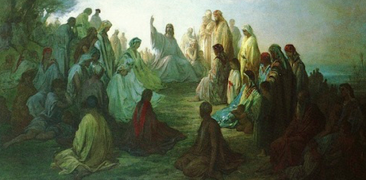 I am amazed, and saddened as well, the lengths Christians, even commentators, will go to read out the “poor” in a vast majority of Bible texts that are so clear and should be necessarily inferred as actual poor. This robs this text in Luke 6 of its gospel-transforming-power, especially with regard to Jesus’ words in the Beatitudes. In Luke 6:20b we read, “Blessed are you who are poor, for yours is the kingdom of God.” (Below I offer my own translation of this verse.) One would think a learned degree is not necessary to hear Luke sets Jesus’ reference to the “poor” in contrast to his equally disturbing reference to the “rich” in what is obviously a paralleled statement in Luke 6:24: “But woe to you who are rich, for you have received your consolation.” In fact, it is much harder to spiritualize Jesus’ reference to the “rich” than it is his reference to the “poor.” This can be seen by the fact hardly anyone does. Luke’s Gospel is filled with such contrasting of the poor and the rich in Jesus’ teachings and in forthcoming parables that we cannot escape something about actual “rich” and actual “poor” is afoot. For example, in Luke 16:20, Jesus compares the poor beggar with the rich man who disregards the beggar only to discover the poor beggar is the one who is blessed in heaven while he was filled (satisfied) on earth: “but now he [the poor beggar] is comforted here [after death], and you [the rich man] are in anguish [after death]” (16:25b). Certainly, given the wider narrative context, there is a link (i.e., a clear and necessary inference) between the “Blessed are . .” and the “But woe to you . . .” contrasted sets in the Luke 6 Beatitudes. This poor/rich contrast is also seen in Luke 21:2, when Luke/Jesus refers to a “poor widow” in contrast to the rich and the pompous pharisees. Later, in Luke 7:22, the proof that Jesus is the messiah and that the kingdom of God had arrived is given by observing what was happening in Jesus’ ministry: “And he answered them, ‘Go and tell John what you have seen and heard: the blind receive their sight, the lame walk, lepers are cleansed, and the deaf hear, the dead are raised up, the poor have good news preached to them.’” Again, in Jesus’ parable of the great feast in Luke 14, the rich are instructed to not invited those who can repay, but invite the poor who cannot repay–again, here is that link to the Luke 6 Beatitudes. (There is also a narrative link to the forthcoming poor beggar/rich man scene in Luke 16 as well.) “But when you give a feast, invite the poor, the crippled, the lame, the blind, and you will be blessed, because they cannot repay you. For you will be repaid at the resurrection of the just” (Luke 14:13). Even when the context and the clear narrative meaning of the text is referencing the actual poor there is a tendency to read out the poor and read in anyone who is “poor of heart.” That certainly keeps the rich satisfied and the poor, well, still poor. This disallows the obvious social/institutional system-contrast Luke has already set up for us in his introduction, that is Mary’s song: he has brought down the mighty from their thrones and exalted those of humble estate; he has filled the hungry with good things, and the rich he has sent away empty (Luke 1:52-53). Thus, restoring the gospel-transforming-power we have robbed from the Beatitudes by reading out the poor from this text. 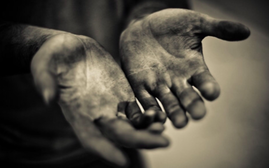 Luke 6:20b: Μακάριοι οἱ πτωχοί, ὅτι ὑμετέρα ἐστὶν ἡ βασιλεία τοῦ θεοῦ. ESV: “Blessed are you who are poor, for yours is the kingdom of God.” My wooden translation: “Flourishing*, the poor (the marginal and powerless), because allotted to you** is the kingdom of God.” Smoothed out: “Flourishing is the marginal and powerless, because to you—the marginal and powerless—is allotted the Kingdom of God.” I try to pay attention to how early church writers render texts of Scripture. Tertullian (155 AD–220 AD) gave Luke 6:20 and this Beatitude the latin beati mendici—“Blessed are the needy,” or “Blessed are the beggars.” He is not the only one who translated the word πτωχοί as “beggar.” While it (i.e., “πτωχοί,” poor) can and probably does simply mean the “poor” (its detonated meaning), its connotative meaning gives a more powerful nuance. For example: The word we translate “poor,” πτωχοί is vivid: one who crouches (as in shamed to be seen) and cringes (as in cowering in the presence of others), thus it is often used of “beggars.” No doubt it carries the concrete reference to someone who is needy, someone who has no power, someone we typically call “marginal” and powerless in society, and in the ancient world one who would have been called “not-or sub-human.” The two times Luke uses this word associated with a particular person are the beggar named Lazarus (being contrasted with the rich man who had everything and disregarded Lazarus, 16:20) and the poor widow vs. the rich/the duplicitous scribes (21:2)—can’t you see what Luke is doing between the Beatitude promise/affirmations and the wider story in his Gospel narrative? There are more of these throughout the Gospel (see chapter 14 for example). The word we typically render the “poor” (πτωχοί) is better understood by how it is used. While it is certainly can be used metaphorically to mean humble,*** or as a Christian virtue, or still better, more simply, as not-arrogant, there is a reason why this word can be used this way. The word has a concrete meaning range of someone without economic means, who is marginal and powerless–again, this is why the word “beggar” isn’t a stretch and certainly fits Luke’s other uses of the word throughout his Gospel. And, it also fits the extremes of the power/powerlessness contrasts that Luke uses to describe the arrival of Messiah and the teachings/parables Jesus uses throughout Luke’s Gospel: beggar (the least and the most without power) vs. the rich (or the mighty, those who have the resources but do not share with the poor, and/or those who do only to/for those who can pay back). You can see how Luke has shaped his Gospel and why it seems a necessary inference to take “the poor” in the Beatitude as exactly that, the poor as in the marginal and powerless. *”Flourishing” is a far better translation for Μακάριοι than either “blessed” or “happy.” **The “you” is a bigger word than the simple pronoun σύ (you), but as you can see is the word ὑμετέρα, which carries the idea of “allotted to you” or “possessed by you.” Split hairs which nuance, but since this is God’s action or promise I lean toward the nuance of “allotted.” ***In the Greek world, the nuanced meaning of “humble” or as a Christian virtue is a much later connotative meaning given this word, πτωχοί, and should not be read back in to how Luke is using the “poor” / “rich” contrast and comparison. 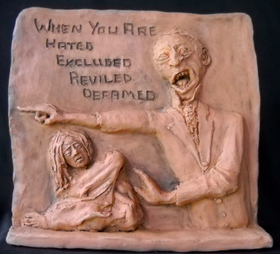 “Blessed are you when people hate you and when they exclude you and revile you and spurn your name as evil, on account of the Son of Man!” (Luke 6:22). While I agree these words are directed at disciples, who will become Jesus’ representatives (probably the meaning behind “on account of the Son of Man,” v. 22e), the description here plays double-duty. Obviously (because we have the whole of the NT to give us fuller understanding) just because one is “poor” or “hungry” or weeping (probably all three is one group), this does not mean they do not need to be born again or qualifies them as automatically born again (something that needs to happen in order for sins to be forgiven, be justified before God, and gain eternal life). Nonetheless, it should be pointed out that “crowd” who came for healing and exorcism would not have been the ones honored nor socially accepted in either the Greco-Roman world nor the Jewish world for that matter. They'd have been the truly marginalized, rejected, and considered sub-human. “. . . a great multitude of people from all Judea and Jerusalem and the seacoast of Tyre and Sidon, who came to hear him and to be healed of their diseases. And those who were troubled with unclean spirits were cured” (Luke 6:17c–18). They would have too easily identified with being hated, being excluded (separated, marginalized, rejected, avoided, ostracize), being reviled, and shunned. The dirty, shameful words trigger: diseased and possessed of unclean spirits. This was their lot, their place in the social castes and institutional systems of the world. The “apostles” that were just chosen (6:13-16), along with the “great crowd of his disciples” (v. 17b), whom the sermon is directed (v. 20), while the larger crowd was listening in—the teaching was very public (and outdoors I might point out!)—they would be as marginalized as the ones who came for healing and who troubled with unclean spirits. Jesus’ appointed representatives (the apostles) and followers (the wider crowd of disciples) would be the poor, the hungry, and those weeping—everything would be turned on its head and the world, its social structure and institutions would hate, marginalize, revile, and spurn those who were truly the blessed, that is the apostles and disciples of Jesus who followed Him and proclaimed this teaching—all on account of being the representatives of the Son of Man, those whom Jesus was reproducing Himself in the world. Yet it would be to them the kingdom belongs, their stomachs would be full (satisfied), and fulled with joy. The appearance of Messiah Jesus and the proclamation of the Gospel—as Jesus’ inaugural sermon indicated (Luke 4:18-19; cf. Isaiah 61:1-2 and 58:6-7)—changes everything about how the systems and structures of this world work (cf. Luke 1:51-53). This is what the beatitudes indicate and mean–and how they should be applied. However, we have traded this all away by making the church (and by that I mean churches and their institutionalized systems) reproduce the world in everything from measures of success to leadership and training to evangelism and (sadly) in our ways of doing and measuring being missional. Discipleship, too often, mimics how the world works rather than what the Beatitudes display.  Lastly, discipleship is not one size fits all. The way Luke has presented Jesus’ Beatitudes is more to expose the structural and systemic, institutionalized empire (Rome-centered, adamic natured) way of defining who is and who is not blessed, who is and who is not honored, who is and who is not fully (or at all) human. What divides humanity. And, addresses the danger of using the world’s way of addressing the issues of poverty and affluence. Take the poor out of Jesus’ reference to the poor and this is lost. This–that is, the Beatitudes are not about “salvation” (that is getting into the Kingdom of God), but about what the new community of God looks like, how it’s system, if you will, works. And this means applying discipleship somewhat (not entirely, but in some specifics) differently to rich disciples and poor disciples. The way to blessing (i.e., kingdom flourishing) is not the way of the world–it is a wholly other way (or as the title of a book I am reading puts it, not the way of the dragon, but the way of the Lamb). Christianity, that is our faith in Christ and our relationship to the church, is not a pathway to success (that is being one of the “rich”). And, our present power granted to us by our place or status in the social structure and current institutions no longer defines us and our neighbors. If one is among the “rich” one best rethink their relationship to the poor and adjust appropriately. Other Sermon on the Plain Wasted Blog thoughts
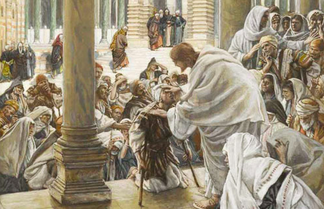 As of January 1, My wife and I live in the Hill, an apartment on Carlisle Street, right next to the Park where we do our summer BBQ ministry. I’m even close enough to walk downtown to meetings and events. One evening, walking back to the apartment from an aldermen’s meeting at town hall, I found myself waiting at a cross-walk when two guys (you can tell, kind of down and out, probably homeless) decided to go, even with traffic coming. One guy had a walker. He walked slow across the intersection, so I headed out with him, telling him, “They’ll have to hit me first.” He smiled and said, “Thanks.” We made it safely, catching up with his friend. They continued to walk slow. I moved on ahead, walking down the block back to my apartment, when I saw a Dunkin Donuts and remembered I had a gift card in my wallet my mom had given me for Christmas. I stopped in to see how much it was for . . . there were no markings . . . $10 the barrister said after scanning it. I went back up the block to my two slow walking friends and said, “Do you guys like coffee?” “Yes,” one of them replied. “I have a gift card for $10—it’s yours.” “Thanks.” They smiled. “Good, we can get a sandwich, too.” I told them: “I can’t take credit for it, my mom gave it to me for a Christmas present.” “Well then, tell your mom, thanks for us.” (I did.) I gave them the card and said, “You’ll see me around. You will see the hat and the ponytail” . . . and, before I could get my name out . . . “Yea, we know. You’re the pastor of the church on Davenport. We know who you are.” How about that? Priceless. Two street, homeless guys, a few blocks from the Hill knew who I was and where our church is. This reminds me that we need to be known . . . and if I get my New Testament correctly, known for the things that indicate the presence of the Kingdom of God. This morning I’d like to bring a messagefrom a thread of passages in the Gospel of Matthew. There is a narrative thread connecting Matthew chapters 4 through 11 that we should listen to, which focuses on Jesus associating with tax collectors and sinners, the poor, the unclean, and the presence of the Kingdom of Heaven. Matthew is asking the readers: How do others know that the Kingdom of Heaven has appeared? To give you the spoiler: Matthew tells us, they can see our association with the poor, marginalized, outcasts, and unclean. This is how they know. I. We are to Follow Jesus around and repeat (what he does):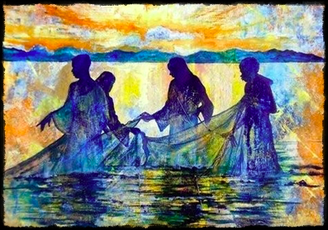 We like to take small bites on the Bible, so sometimes we miss big picture things. And, this is a Big Picture Thing we need to see so we may be better readers of Matthew's Gospel and more faithful followers of Jesus. We begin in Matthew 4:19 where Jesus makes the invitation, “Follow [lit. come after] me and I will make you fishers of men.” The command is to come-after Jesus. That’s the command--follow after me, really follow me around. Most think the command is to be fishers of men—it is not, that’s the promise. We are called to follow Jesus around and he promises to make us fishers of men. By getting the following correct, we become fishers of men. So, what does it mean to follow Jesus around—Matthew tells us. Straight away, just after the call to follow Jesus, Matthew reveals what it was like to follow Jesus around. There is a divine, inspired-ness to what the Gospel writers place into the narrative . . . so right after the scene where Jesus calls us to follow him around, we have . . .
Matthew tells us: we are made fishers of men by following Jesus around—and what did he do?
What we might not realize, however, is Jesus’ first encounter afterHe finishes the Sermon . . . Matthew could have introduced a dozen different encounters, but this is the one He chooses:
This is the Sermon on the Mount realized, illustrated, fulfilled. The Monday after the Sunday Sermon as it were. Now I’m going somewhere with this, so for now remember, following Jesus is actually following Jesus around, learning to do what he did . . . now, we are to repeat . . . *This sermon was preached at Redeemer Presbyterian Church in Concord, MA on Sunday, May 19, 2019. The full sermon maybe downloaded as a PDF (here). An audio version is also be available >> Audio version Part I | Part II | Part III | Part IV
“. . . but go rather to the lost sheep of the house of Israel” (Matthew 10:6)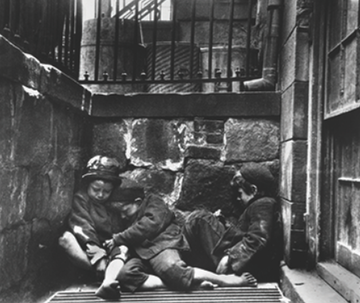 There is an interesting nuance to Jesus’ commission to the twelve in Matthew 10: When Jesus instructs them not to preach and heal and cast out demons among the Gentiles and Samaritans, he, however, specifically directs them to “the lost sheep of the house of Israel” (10:6). Again, this seems a verse we read (into) as another “everyone” text, that is “go to everyone in Israel for all of them are lost sheep.” Let’s reconsider: The word Jesus uses for “lost” here in 10:6 isn’t rendered at all very well by English translators. It is a specific word and no-where does it actually mean “lost” the way most of us modern Christians read the word and certainly doesn't carry the weight of a religious overtone of “lost” as in unsaved. The word is ἀπόλλυμι (apollymi, destroyed, banned is actually a good word). As this word is used (and rendered) elsewhere in the NT, a more consistent translation would have been “go rather to the destroyed sheep of the house of Israel.” This nuance changes how we read this charge to the twelve. If the English “banned” (a fair rendering as we shall see) is used, the resulting condition is nuanced to description, namely, of those “who have been shunned to destruction.” In fact, there is even more nuance to be heard from the word and the context. Previously in the immediate paragraph, Matthew depicts the scene in which Jesus has been ministering to the sick, outcast, marginal, disgraced, and poor (9:35). Jesus looks upon this crowd, Matthew narratives, telling us that He “he had compassion for them, because they were harassed and helpless, like sheep without a shepherd” (v. 36b). There is no doubt Jesus and Matthew are drawing upon an Ezekiel context where God interjects, “So they were scattered, because there was no shepherd” (Ezek 34:5). Yet, just before in 34:4, the people, i.e., the sheep, carry the same conceptual (sociological) description as does Matthew 9 and 10 regarding the condition of certain Israelites, i.e., “the lost sheep of Israel”:
Additionally, as you can see in the brackets above, the LXX OT (i.e., the Greek OT) uses the word ἀπόλλυμι (apollymi, destroyed), the same word use by Jesus in his instructions to the twelve in Matthew 10:6. English translators (virtually all) render this word in Ezekiel 34 and Matthew 10 as “lost” (as in “lost sheep”). In both Ezekiel and Matthew, this strong word gives a very subtle description of the people as vulnerable sheep who are “put out of the way entirely, abolished, destroyed.” Elsewhere in the New Testament, this word, ἀπόλλυμι (apollymi, destroyed), is used to give a rather dire description of a person's condition as a result of the actions or behaviors or attitudes of others.
The more accurate rendering of “lost” as destroyed (ruined, banned, shunned) helps to further see an actual sociological condition in the use of “lost sheep” to describe people or a person. In Luke for example, the treasured images of “lost sheep,” then, brings out (for significance and application) a rather different imagination regarding those that are in a condition of “lost.”
In Luke above, we can, then, see that the lost sheep are left alone, unprotected, vulnerable to the elements, lions and tigers and bears (literally), and is, thus, in the condition of “destroyed.” Jesus juxtaposes the restoration given by Zaccharus with His own mission to seek and to save the destroyed, the banned, the shunned. In this latter text, Zaccharus' own salvation is related to making people whole since he contributed to their condition of “ruin" (of being banned, shunned, destroyed). Now returning to the “the lost sheep of the house of Israel” (of Matthew 10:6), we offer a more sociological-rhetorical reading of the verse. While apollymi (“lost” as rendered in most English transitions) in v. 6 certainly is a strong word and “destroyed” is perfectly acceptable as a translation, we should also note that this is the word used to describe those who have been banned from synagogue. Also, the raw, wooden transliterated meaning of this word, apollymi, literally means “from let loose,” “let loose from,” “unloosed”). This is most certainly its meaning later when the local synagogue leadership in Caperneum made plans to “destory” (i.e., ban) the man whose withered hand Jesus had healed: “But the Pharisees went out and conspired against him, how to destroy [apollymi] him” (Matthew 12:14). [Whether the antecedent of “him” relates to the healed man or Jesus, the implication is to be banned from the synagogue.] Finally, given the nature of Jesus’ primary audiences thus far and Matthew’s summaries of His ministry (4:23-25; 9:35-36; et al), perhaps we should read “lost” as “banned sheep of the house of Israel,” specifically identifying the marginal, infirm, mentally unstable, demon-possessed, poor, outcast, and disabled sheep of the house of Israel—all whom would have been shunned away from synagogue life, not just figuratively speaking, but banned from the worshipping and religious life of Israel. Is it no wonder the temple-leadership did not like and was angered (or is that threatened) by Jesus' association with tax collectors and sinners? Leveling and equalizing the idea of “lost” in the Gospel narratives to simply a “we all are sinners in need of salvation” (albeit true, of course) places a barrier to faithful readings that put the poor and the marginalized of society in the purview of sound application in the life of the church (a church).
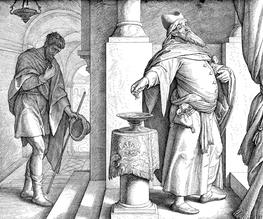 If you offer mercy and care to the poor so you are seen by others for their applause, for your own glory, honor, status . . . if you pray in ways so you may be seen and admired by others . . . if you fast to be recognized and esteemed by others, you are a hypocrite like the others. And, so, you are, then, not poor in spirit, not one who mourns, not meek and you do not thirst and hunger for justice, nor are you merciful, nor clean of heart, nor a peace-maker, thus, you will not receive reward from the Father who is in heaven. The kingdom is not yours. You shall not be comforted. You shall not inherent the earth. You will not be satisfied. You shall not receive mercy. You shall not see God. And, you will not be called “sons of God.” Seeking the applause of others for caring for the needy and seeking to be seen praying and fasting by others most certainly means you will not be persecuted for righteousness’ sake. Neither will you be reviled, and rather than having all kinds of evil uttered against you, you will be lauded with accolades and honor and status, and, therefore, you will not receive God’s gracious heavenly rewards, for you will have already received your reward. You are “shining” so others will give you glory rather than give God glory. And, in the end, you will not be able to claim that you have been cheated, for you will have been paid in full by the glory (applause, recognition, honor, status) given to you by others.
 So many values and virtues, which came from the appearance and presence of Christianity in the world 2,000 plus years ago, in our culture, exist today as noble and ideals amongst society, so much so that the intent of Jesus’ Blesseds are now tempered, eased, toned down, dulled, softened. Their bite taken out. Their edge taken off—so that their radical, self-righteous slaying, Christendom destroying, idol bashing, social leveling, culture reversing power is missed and dismissed by much of the church and ignored as simplistic and assumed platitudes by modern crowds. The gospel is actually missed.
We exist at a time when the Cheshire cat smile of these Beatitudes exist (in vague social and cultural forms and weak values and virtues, and, even, as political correctness); but the cat (i.e., the intent Jesus had in the first place) is all gone. These verses, Matthew 5:3-12 (above), were the most oft quoted, referred to, and referenced New Testament texts in the first 150 years of the church. They were the call (invitation) to the faith, the test of faithfulness, and the bane and annoyance of existing powers. You want to know how Christianity spread so rapidly and the church increased beyond imagination in the first 150 years--they actually believed the Beatitudes. And, did them. The early believers, mostly poor and lacking resources, small and powerless and often hidden, lived the life the Beatitudes described, endured attacks against the message they implied, and, as a result, out-lived an empire. Our problem now, is we like the smile but care not the cat has disappeared. We've turned much of the Beatitudes 180° degrees from their original intent that they no longer slay us nor confront the culture (or the church) with all its social hierarchy and status, its vertical world. The Beatitudes are interpreted and used in ways so that the rich, famous, elite, the educated, the privileged and advantaged are comforted to think that they are, as well, “poor in spirit," so they get to keep their privilege and advantage (as long as they recognize their "spiritual poverty"). The privileged get to continue in the culture and social structures that gave them their advantage. Heck, theirs is the kingdom! Now and in the future. Who wouldn't want that deal? The Beatitudes are not a platform for your privilege, fame, celebrity, or power . . . they are to disturb everything that made you, that enabled you to have social status, to destroy every advantage you have had to enjoy the privileges you have . . . the Beatitudes level, they turn (for those who believe the kingdom of heaven has come) the verticalization of this social and cultural world (with all its advantages) and horizontalizes everything. If the Beatitudes don't do this to you, then you are seeing just the Cheshire cat smile. The cat is gone. 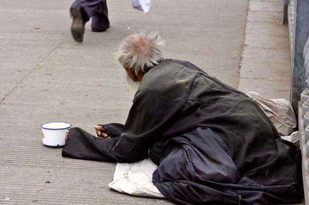 How do the rich, affluent, powerful, and wealthy break and destroy the idols that blind them and make them deaf? They accept the invitation to a kingdom, the kingdom of heaven, where the poor in spirit (the actual poor among them, the outcasts, marginal, uneducated, the sick, infirmed, and afflicted, and mentally unstable; cf. Matthew 4:24-5:1); where those who mourn for lack of recourses; and, where the meek, that is the powerless, have the kingdom, will be comforted, and shall inherit the earth. This is the kingdom to which the affluent, wealthy, and the advantaged, that is the powerful and resource-rich are invited. Of course, these lines in the list of Beatitudes are for all who seek first God’s kingdom and his righteousness. I am here focused on the powerful and resource-rich who hear this gracious invitation to the kingdom of Heaven. This is the kingdom to which the powerful and resource-rich are invited, a kingdom where they thirst and hunger for justice [yes, that’s exactly how I believe Jesus meant it]; where they will extend mercy because it is the merciful that will receive mercy; where the clean in heart make room for the unclean, because they see God; where they will be peace-makers, because they will be called Sons of God. This is an impossible invitation: for those who have been made blind and deaf and immovable because of their idols, these need the gospel, the power of God unto salvation. This is why Jesus died on that cross. This is the way in which God changed the world—really, the way in which he brought into existence, the reality of his recreated world, his kingdom of heaven. Yet, still, these words of the Beatitude are an invitation, waiting for you, through the gospel of Jesus Christ, to accept. In the end, both at our death and at the end of time, this is the kingdom that matters, the only kingdom that will remain. It is the kingdom of heaven to whom God, the Most High, will give to his saints (Daniel 7:18). This is why it makes sense that “the poor in spirit” are blessed, “because theirs is this kingdom.”
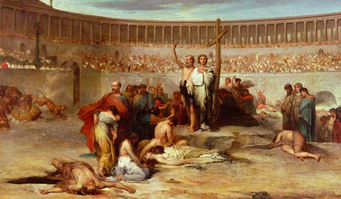 I must make two confessions up front as I began reading through the much treasured, but very often misunderstood John 13 footwashing scene of Jesus and his disciples: First, the eighteen plus years as a planner-grant writer, program developer, and instructor in the social action field, working for agencies that help the poor and low-come, has made me more aware of the Bible’s overwhelming connection to the poor. I most definitely read the Bible differently now. I can see more clearly what I have passed over, spiritualized, and, too often, ignored. I now pick up on nuances in biblical texts and stories that were blurred by my suburban, more privileged up-bringing and how my early Christian years were shaped. I confess am no longer a poor rich reader of the Bible. Second, and with a deep breath, I confess I am burdened and terrified by the call to minister in the Hill community in New Haven, Connecticut. I awake with burdens beyond what I could have imagined as I seek to minister in this broken, yet beautiful community called The Hill. Frankly (and some tell me, don’t let them know how you really feel, don’t show weakness), I am scared to death, sometimes awakening and wondering, “What in the world have I gotten myself and my wife into here?” Scared I’ll mess it up. Frightened that my vulnerabilities will be seen. Afraid my shortcomings, my age, may exhaustion, my weaknesses, and inabilities will be too soon noticed. Yet as Paul heard from God, I too rest in the words, “‘My grace is sufficient for you, for my power is made perfect in weakness.’ Therefore, I will boast all the more gladly of my weaknesses, so that the power of Christ may rest upon me . . . For when I am weak, then I am strong.” So, with humility I approach the text, weak and a common sinner in the hands of an all-too-gracious heavenly Father . . . and you, with so many reasons to listen to others, but with hopes you will hear the text. Let us pray . . . Let’s time travel back to the first few hundred years of church history. Most of us are familiar with the Greco-Roman colosseums and the brutality of the gladiatorial entertainment in the days of the Roman empire. In those colosseums there was a theater of real, unashamed, and intentional death that was designed to displayed the vertical nature of society, of social order, who had status and who did not—and who was and wasn’t a person. Why do I start here? The arena of death and violence is, you must understand, still the experience of so many around the globe today and in most urban centers in the US and in The Hill community—designed by default and intention, in our very built environment—continues to affirm social vertical status and, dare I say, what we affirm as human. Yet, Jesus and the gospel itself point to a leveling . . . displayed in and through and by the church . . . John 13 will paint this picture for us. Religion in the Roman empire was widespread, huge, and multiple. And yet, no one would have imagined that by the early 4th century Christianity would become a major world religion with adherents numbering among the most significance slice of the empire’s population. But the church didn’t start out that way: the first small congregations had no power, no leverage of status, no influence, and certainly no money. So how? As we read through the early church literature and church fathers, one would look in vain for references specifically to “evangelism” as a verbal witness as a matter of the Christian and church life . . . in fact “speaking” would have probably done nothing and no one would have listened (anyway). Literally in the first few hundred years, Christian literature makes no reference to “evangelists” and or even “missionaries.” So, how? Back to the arena games, say around AD 203: The colosseum-amphitheater was a wonder of Roman engineering. Everything about the architecture and the events were to show off the vertical nature of life and social standing in the Empire . . . vertical . . . higher sections . . . seated by wealth and influence . . . how the stands were filled . . . the upper sections were the visual center . . . magistrates, landowners, benefactors, the elite . . . the entertainment of the populace to bolster status and prestige—all affirming the vertical values of society and civil life. All the while, who were in the death-pits, the forced entertainment of death at the bottom of the arena? Of course the gladiators and lions, but it was the bottom of society that faced death—criminals, the unwanted, slaves, the abandoned—all for sport and entertainment. There we also find small bands of Christians . . . but they faced death (face the beasts and gladiators) differently; their presence in the arena subtly subverted the carefully choreographed vertical event. The masses saw husbands (the paterfamilias, head of households), wives, slaves, doctors, former prostitutes, unwanted children standing together . . . expressing publically right there in the arena Christian horizontality. (Yes, that is a word.) When one would fall, the others would help them up to face death standing. They did not defend themselves in any way. Although the whole of the gospel and NT teaching is behind their behavior, but it is the fact that Jesus left a footwashing community and not a militia or even an academy to invade this world IS THE HOW Christianity grew to overtake an empire. Here in John 13 we have a portrait, along with Jesus’s words, a powerful image and reminder of what the Christian community is to look like in the private habits of our worship and out in the public, in Caesar’s arena of death. The cliché is an easy one: Jesus had to leave, but he left a community. The harder thing: John leaves a community of footwashers to show his love to a watching public world: Jesus’ presence in the world is displayed by a mutually loving church that demonstrates the leveling of humanity, the horizontality of God’s love. Our focus is John 13:33–35—and how these verses stand in the midst of the footwashing scene, surrounded by a traitor among them (Judas) and Peter’s brash, impatient display of allegiance. Little children, yet a little while I am with you. You will seek me, and just as I said to the Jews, so now I also say to you, ‘Where I am going you cannot come.’ A new commandment I give to you, that you love one another: just as I have loved you, you also are to love one another. By this all people will know that you are my disciples, if you have love for one another” (John 13:33–35). Everything seems driven by these words from our Lord, here in chapter 13 and all through John 13-17. So we will center on these verses through the footwashing and the outer bookends texts about Judas and Peter in John’s narrative. I. Setting the stage with the footwashing example–Jesus prepares his new community for his departure II. The juxtaposition: The Traitor (Judas) and Brash, Impatient Denier (Peter) III. The power and habits of our text: The Presence of Jesus is the loving-one-another church–the visible, tangible leveling power of the gospel For the full sermon text, please click the download file below . . .
While attending an early morning men’s prayer and devotional time (as a guest of the one leading the study component), I was horrified by some of the strained thoughts on the passage. The study leader actually tried to stick to the James text; it was the poor rich readers that made comments to lessen the impact of what God was saying through James' words in chapter 5 of his letter. Here are some of my thoughts as the poor rich readers of the Bible commented on James’ words:
Some might not think it, but I was being charitable here. My thoughts were a bit more harsh and even more direct than what I penned above. I will grant that it took me eighteen years after becoming a Christian to begin to see how suburban, affluent, and political I had been reading the Bible--all the while thinking I was interpreting rightly. We need to stop taking the poor out of the texts that actually call us to judgment for not doing something for the poor--neutrality, distance, time, politics will not be allowed as excuses on that day God judges all of our hearts. For on "that day" our riches will have rotten and our garments will have become moth-eaten. Our gold and our silver will have rusted; and their rust, on that day, will be a witness against us and will consume our flesh like fire.
|
AuthorChip M. Anderson, advocate for biblical social action; pastor of an urban church plant in the Hill neighborhood of New Haven, CT; husband, father, author, former Greek & NT professor; and, 19 years involved with social action. Archives
February 2024
Categories
All
|
|||||||||||||||||||||||||||||||||||||||||||||||||||||
Pages |
More Pages |
|

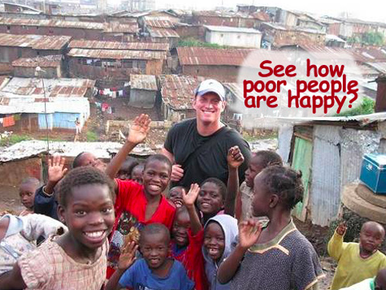
 RSS Feed
RSS Feed